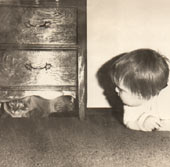
We had just seen a movie the other day, and were poking around a nearby Barnes and Noble, idly wasting time on a day off. On the way out of the store, I paused to peruse the table of "New Paperbacks," and noticed to my surprise and pleasure a book called Kornwolf, written by Tristan Egolf. I was a fan of his debut novel, Lord of the Barnyard, and like most of his admirers, eager to track what would surely be a promising literary career.
The synopsis on the back of the book started on an ominous note: "Tristan Egolf was one of our most promising writers...." Wait a minute, I thought, "was"? Mystified, I opened it to the bio, and my fears were confirmed; Egolf had died in 2005. Further searching online reports that he died May 7, 2005, of a self-inflicted gunshot wound--suicide. He left behind a fiancee and a young daughter.
News of his passing had escaped me until this point. It puts a subtle lie to my portraying myself as an "eager follower." I was aware of his second novel, The Skirt and the Fiddle, but never developed more than a trifling interest in fulfilling my desire to "follow this growing talent". Now such an endeavor becomes painfully simple to undertake. Barring any discovery of a stash his of nearly-finished manuscripts, Mr. Egolf's growth can be charted in the span of three novels.
Much was made of Mr. Egolf's appealing backstory upon Barnyard's publication: the daughter of a prominent French novelist discovered him barefoot and playing guitar on a bridge in Paris, initiated a dialogue between the busker and her father, who encouraged Egolf to finish his manuscript, which was quickly published to some acclaim in France. It is a story almost too perfect to believe, evoking images of elegantly urban European bohemia, and a culmination of the stock fantasy of legions of aspiring ecrivains everywhere. Mr. Egolf dropped out of college, quit his punk rock band, split for a shabby room in Paris to devote his attention to finishing the book that he knew he had to write, tending bar and strumming his guitar to keep bread and water on the table. All that's missing are a bickering group of threadbare intellectuals sent from central casting.
The only deviation from this shopworn plot is the niggling fact that for Mr. Egolf, it all worked out exactly right. He finished his book, won the respect of those threadbare intellectuals, and got himself thrust to the upper crust of the literati world. It must certainly have worn on the brittle feelings of those for whom such dreams were never realized, for just as Lord of the Barnyard gained praise for its inventiveness and fevered exposition, it gained an equal amount of scorn for what some perceived as amateur's luck and an accompanying lack of a veteran hack's ability to self-edit. It was called unwieldy as much as it was called triumphant. He garnered all the troubling comparisons: Faulkner, Robbins, and the like. And now that he's gone, there are too many self-satisfied comparisons to another artist whose meteoric brilliance was cut tragically short, John Kennedy Toole.
Such is the nature of contemporary literature in a world that has little time and scarce interest for a diversion as anachronistic and self-important as contemporary literature. Succeed at your peril, yet succumb under the hypocrite clucking of tongues.
Now that Mr. Egolf is gone, complaints that he couldn't put a filter on his restless imagination, take an editor's ruthless scythe to his labyrinthine plotting, are rendered obsolete. Now that there will be no more, what's left will never seem enough.
Go out and get a copy of Lord of the Barnyard now, if not simply because it's a ripping good yarn, then at least to stem off the disappointment and ennui that's sure to come when it gets transmuted into an insufferable, toothless Brad Pitt/Leonardo DiCaprio vehicle .






